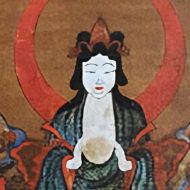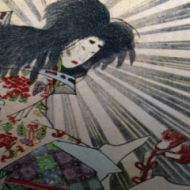Tsukuyomi : The Moon God
Listen
At a glance
| Description | |
|---|---|
| Origin | Japanese Mythology |
| Classification | Gods |
| Family Members | Izanagi (Father), Amaterasu (Brother), Susanoo (Brother) |
| Region | Japan |
| Associated With | Moon, Etiquette, Ethics |
Tsukuyomi
Introduction
In Japanese mythology, the deity of the moon known as Tsukuyomi is referred to as “The Great God Tsukuyomi.” This name means something similar to “moon-reading,” and it’s linked to the idea of sitting on the moon and reading poetry. Like the moon, he is also kind and peaceful, but he is often regarded as an evil character.
He was a god who cared deeply about order and etiquette, and he would go to great lengths to enforce it. Like Amaterasu, he was a proud god who stood for what he believed in. Even though killing was wrong, he would still do it in order to try and enforce the rules. Etiquette is a fundamental part of most cultures, and killing is considered a breach of it.
Physical Traits
Despite the moon being regarded as a beautiful and worthy object to view, the deity of the moon known as Tsukuyomi is regarded as a negative figure in Japanese folklore.
Family
Tsukuyomi, the son of Izanagi was born as a part of a cleansing ritual following his father’s visit to the Japanese Land of the Dead, which is known as the “Yomei Land of the Dead.” Izanagi tried to reclaim his wife, but he failed. He then realized that she had consumed the food that was offered to the dead. As he had visited the land of the dead, and he was covered in impurities. However, after cleansing himself, he found that something miraculous had happened to him.
Akami, or gods, were created out of his face. Amaterasu, Tsukuyomi, and Susanoo were all born from the left eye right eye and nose respectively. Izanagi said that they were the most important deities in the universe, and they would rule together. After meeting each other, Amaterasu and the moon god, known as Tsukuyomi, were married. It’s not clear if the children that the sun goddess had were the moon god’s or if they were his. Some stories claim that the Shinto deity was the father of the Japanese imperial family.
Other Names
The deity of the moon known as Tsukuyomi is referred to as “The Great God Tsukuyomi.” This name means something similar to “moon-reading,” and it’s linked to the idea of sitting on the moon and reading poetry. In pre-modern Japan, this practice was commonly practiced in the noble courts. Sometimes, he is called Tsukuyomi Otoko or Tsukuhito Otoko, which literally means “moon-reading man.”
Powers and Abilities
He was a god who deeply believed in the ideals of etiquette and order. He would go to great lengths to enforce these rules, even though killing was considered a breach of them. This is why he is willing to break them in order to maintain order. Sadly, this god isn’t mentioned as much in Japanese mythology as many others, despite his fascinating tales. But he did have a critical role in the origins of day and night.
Modern Day Influence
In many cultures, a deity’s contradiction is common. It can be seen as dualism, which occurs when a concept or belief is presented with conflicting ideas or concepts. Some believe that the moon god was male, while others think he was just rebellious. Either way, the moon god would spend the rest of his life fighting to get back to what was. In manga and light novels, he is an important character. In Naruto, the deity of the moon known as Tsukuyomi is referred to as a technique that involves placing people under a spell that can induce intense torture. In the Shin Megami no Tseki series, he is a demon. In FFXIV, he is depicted as a woman.
Related Images
Frequently Asked Questions
What is lorem Ipsum?
I am text block. Click edit button to change this text. Lorem ipsum dolor sit amet, consectetur adipiscing elit. Ut elit tellus, luctus nec ullamcorper mattis, pulvinar dapibus leo.
What is lorem Ipsum?
I am text block. Click edit button to change this text. Lorem ipsum dolor sit amet, consectetur adipiscing elit. Ut elit tellus, luctus nec ullamcorper mattis, pulvinar dapibus leo.
What is lorem Ipsum?
I am text block. Click edit button to change this text. Lorem ipsum dolor sit amet, consectetur adipiscing elit. Ut elit tellus, luctus nec ullamcorper mattis, pulvinar dapibus leo.
What is lorem Ipsum?
I am text block. Click edit button to change this text. Lorem ipsum dolor sit amet, consectetur adipiscing elit. Ut elit tellus, luctus nec ullamcorper mattis, pulvinar dapibus leo.
What is lorem Ipsum?
I am text block. Click edit button to change this text. Lorem ipsum dolor sit amet, consectetur adipiscing elit. Ut elit tellus, luctus nec ullamcorper mattis, pulvinar dapibus leo.











